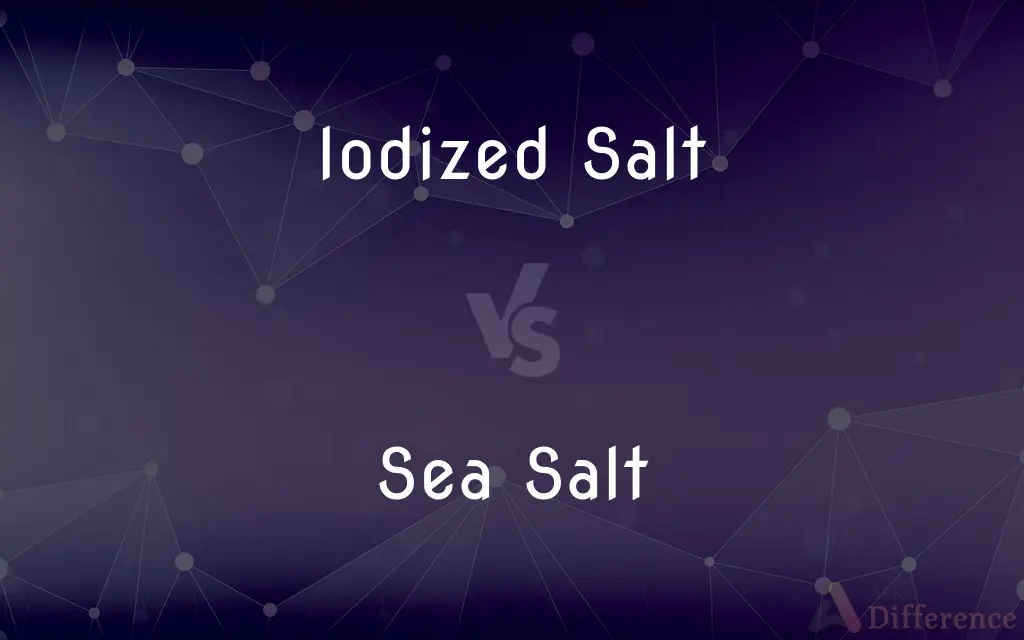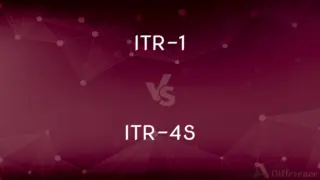Iodized Salt vs. Sea Salt — What's the Difference?
Edited by Tayyaba Rehman — By Fiza Rafique — Published on December 28, 2023
Iodized Salt is table salt fortified with iodine to prevent deficiencies, while Sea Salt is derived from evaporated seawater and retains various trace minerals.

Difference Between Iodized Salt and Sea Salt
Table of Contents
ADVERTISEMENT
Key Differences
Iodized Salt and Sea Salt are both popular choices in culinary practices, but they differ in their sources and nutritional components. Iodized Salt is primarily mined from underground salt deposits and is processed to include iodine, a nutrient that's crucial for thyroid function. In contrast, Sea Salt is harvested by evaporating seawater, maintaining some of the trace minerals found in the ocean.
The primary purpose behind the introduction of Iodized Salt was to combat iodine deficiencies, which can lead to conditions like goiter. Sea Salt, on the other hand, is often appreciated for its coarse texture and richer flavor profile, brought about by the various minerals it contains.
While Iodized Salt undergoes a refining process to achieve its uniform crystals and added iodine, Sea Salt production is more natural, as it crystallizes through the evaporation of seawater. This process for Sea Salt can result in diverse flavors and colors based on the water source.
Both Iodized Salt and Sea Salt find their places in different culinary applications. Iodized Salt's consistent grain size makes it ideal for everyday cooking and baking. Conversely, the unique texture and mineral richness of Sea Salt make it a preferred choice for finishing dishes or for use in specific gourmet recipes.
From a health perspective, while Iodized Salt ensures an iodine intake, Sea Salt provides a broader range of trace minerals. However, it's crucial to note that excessive salt consumption, regardless of the type, can have health implications.
ADVERTISEMENT
Comparison Chart
Source
Mined from underground deposits and fortified with iodine.
Harvested by evaporating seawater.
Nutritional Benefit
Provides iodine to prevent deficiencies.
Contains various trace minerals from the sea.
Processing
Refined and fortified with iodine.
Naturally crystallizes from evaporated seawater.
Texture and Flavor
Consistent grain size with a neutral taste.
Coarse texture with a richer flavor from trace minerals.
Primary Use
Everyday cooking and baking.
Finishing dishes and gourmet recipes.
Compare with Definitions
Iodized Salt
Table salt fortified with iodine.
Using Iodized Salt helps prevent iodine deficiencies.
Sea Salt
Salt obtained from evaporated seawater.
Sea Salt often contains trace minerals that add flavor.
Iodized Salt
Salt treated with iodine to meet nutritional needs.
It's advisable to consume Iodized Salt for thyroid health.
Sea Salt
A natural salt with varying textures and flavors.
He loves the crunch of Sea Salt on his salads.
Iodized Salt
A refined salt with added essential nutrients.
Many households prefer Iodized Salt for daily cooking.
Sea Salt
Unrefined salt derived from the sea.
Sea Salt is her choice for seasoning seafood dishes.
Iodized Salt
Regular salt enhanced for health benefits.
She always buys Iodized Salt to ensure she gets enough iodine.
Sea Salt
Salt crystallized from the natural evaporation of seawater.
Gourmet chefs often prefer Sea Salt for its rich taste.
Iodized Salt
Salt processed to combat iodine-deficient conditions.
Iodized Salt was introduced to reduce the risk of goiter.
Sea Salt
Harvested salt retaining ocean mineral properties.
The mineral content can give Sea Salt its unique color.
Common Curiosities
Is Iodized Salt better for health?
Iodized Salt ensures iodine intake, which is crucial for thyroid health, but all salt should be consumed in moderation.
Which salt is best for cooking?
Both salts can be used, but Iodized Salt is common for everyday use, while Sea Salt is often chosen for finishing or gourmet recipes.
Why is Sea Salt considered natural?
Sea Salt is directly harvested from evaporated seawater, retaining its trace minerals.
Is there a taste difference between Iodized Salt and Sea Salt?
Yes, Sea Salt often has a richer flavor due to its trace minerals.
Which salt is coarser?
Sea Salt generally has a coarser texture than Iodized Salt.
What is Iodized Salt?
Iodized Salt is table salt that has been fortified with the essential nutrient iodine.
Why was iodine added to salt?
Iodine was added to salt to prevent iodine deficiency disorders, such as goiter.
Is Sea Salt more organic than Iodized Salt?
Since Sea Salt is minimally processed and retains its natural minerals, it's often considered more "natural" or "organic".
Can I get enough iodine from Sea Salt alone?
It's unreliable to depend on Sea Salt for adequate iodine intake since its iodine content is inconsistent.
Which salt is better for baking?
Iodized Salt, due to its consistent grain size, is often preferred for baking.
Does Sea Salt contain iodine?
While Sea Salt might contain traces of iodine, its levels are inconsistent and often much lower than Iodized Salt.
Do both salts have the same sodium content?
Generally, yes, but the exact content might vary slightly based on the brand and processing.
Does Sea Salt come from different sources?
Yes, Sea Salt can come from various locations, each potentially imparting a unique flavor and color.
Is one salt more expensive than the other?
Often, Sea Salt, especially gourmet varieties, can be pricier than Iodized Salt.
What gives Sea Salt its unique color variations?
The trace minerals from its source can influence the color of Sea Salt.
Share Your Discovery

Previous Comparison
Atomic Orbital vs. Molecular Orbital
Next Comparison
ITR-1 vs. ITR-4SAuthor Spotlight
Written by
Fiza RafiqueFiza Rafique is a skilled content writer at AskDifference.com, where she meticulously refines and enhances written pieces. Drawing from her vast editorial expertise, Fiza ensures clarity, accuracy, and precision in every article. Passionate about language, she continually seeks to elevate the quality of content for readers worldwide.
Edited by
Tayyaba RehmanTayyaba Rehman is a distinguished writer, currently serving as a primary contributor to askdifference.com. As a researcher in semantics and etymology, Tayyaba's passion for the complexity of languages and their distinctions has found a perfect home on the platform. Tayyaba delves into the intricacies of language, distinguishing between commonly confused words and phrases, thereby providing clarity for readers worldwide.













































